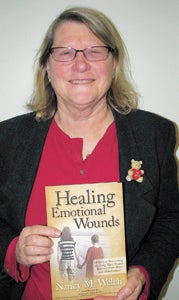Author hopes to overcome stigma
Published 9:03 pm Saturday, February 15, 2014
A book by a local author about overcoming the odds after adopting troubled children from an Eastern European country is set to hit stores this spring.
Dr. Nancy Welch, the director of the Chesapeake and Western Tidewater health districts, will hold a book signing for “Healing Emotional Wounds” at the Greenbrier Barnes & Noble on April 12 after the book’s release on April 8. It already is available in digital form.
She said she wanted to write the book to help overcome stigma associated with mental illness. Her daughter and son, adopted from the Ukraine in 1999 at age 6, have been diagnosed with bipolar disorder and Asperger’s syndrome, respectively.
“We need to look at any mental illness the same as we look at hypertension,” Welch said. “The stigma is a barrier for people to get care. It’s as if we’re saying the individual has total control. Just because we can’t draw a blood sample to measure how bad it is doesn’t mean it’s not a medical diagnosis.”
Welch admits she never envisioned herself as a mother — and, after she reached her 50s still single, it did not appear destined to happen until a friend suggested she look into adoption.
She placed her name on the list of a local adoption agency that arranged private adoptions for newborns and infants. But the agency allowed birth families to choose their adoptive families, and the birth parents naturally chose younger couples.
But then someone from the adoption agency recommended Welch to an organization that worked with Ukrainian orphanages. A representative visited on a Saturday morning and said he was leaving in two days to take a trip to the Ukraine. He urged her to come with him.
As it happened, Welch and her sister and brother-in-law already had a trip to Scotland planned.
“It was very easy,” she said. “I just changed some of our flight plans.”
On her visit to the Ukraine, Welch was overwhelmed by everything she saw. But what overwhelmed her the most was choosing her two children.
“It wasn’t sparkles or shiny or anything mystical,” she said. “I just knew they were the right ones.”
Six months and piles of paperwork later, Welch returned to the Ukraine to pick up her children.
The girl had been found barely surviving on the streets. She had been adopted by an Italian family and brought back because of her violence. The boy was born to a substance-abusing mother, and the nurses at the hospital thought he would die and did not provide much care for him. When he was still alive after six months, they finally took him to the orphanage as well.
Back home, the new family’s struggles would horrify many parents. The girl’s violence was so great that she had to be committed. Several neighbors opened their homes as “safe houses” with the agreement that the boy could come over during his sister’s rages. Eventually, Welch pressed charges against her daughter and had the girl’s room remodeled so that she couldn’t break doors or walls. Those turned out to be the turning points.
“She realized these were community standards, that it wasn’t just me,” Welch said of the charges. The remodeling of the room “turned out to be a really positive thing. It was like she had permission to be angry, but she had to respond in a way that was not destructive.”
Welch said she got through it with her personal motto, “I’ll find a way,” and the help and support of family, friends, neighbors, co-workers, church members and total strangers.
The children, now in their early 20s, supported their mother writing the book, Welch said.
“They’re so proud of how far they’ve come,” she said. “They want this book to be published. They want the stigma to be removed so there can be hope. If we get over this stigma, we also can be better at helping each other.”







